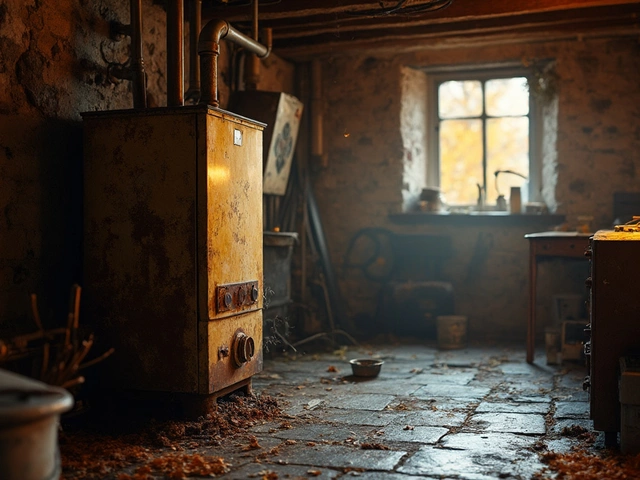If you've had your boiler clicking, wheezing, or showing random error codes, you know it's more than an annoyance—it's urgent. Heating is a big deal, especially when you wake up to a freezing house and a stone-cold shower. But finding the right person to service your boiler can feel overwhelming. Plumbers, heating engineers, gas fitters—who does what, and who should you trust not to blow up your pipes or disappear after cashing your check? With tighter regulations and new heating tech rolling out in 2025, there’s even more to consider now. Skip the stress—I’ll break down everything you need to know, no tech talk or scare tactics.
Understanding Who’s Qualified to Service Your Boiler
Not all handymen are created equal when it comes to boilers. In the UK, for example, a legal requirement states only engineers on the Gas Safe Register can service gas boilers. This isn’t just paperwork—it’s about safety. Gas leaks and carbon monoxide are silent but deadly, with more than 60 accidental deaths a year in the UK alone blamed on poor gas appliance work. If you’ve got an electric or oil boiler, the rules shift. Oil boiler work is covered by OFTEC-registered engineers, while certified electricians usually handle electric models. You can find these badges on websites, vans, or their ID cards—don’t be afraid to ask for proof before someone touches your boiler.
So who exactly do you call? Here are the most common (and reliable) picks:
- Gas Safe registered engineers: Mandatory for gas boiler servicing and repair. No exceptions.
- OFTEC-registered technicians: For anyone with oil boiler systems.
- Qualified electricians: If your home runs on an electric boiler, get a Part P certified sparky.
- Manufacturer-approved service partners: Many boiler makers certify their own trusted engineers—great if your boiler’s under warranty.
Don’t trust a builder, odd-jobber, or a “friend of a friend”—this isn’t leaky tap territory. One wrong move and you might void your warranty or, worse, endanger your family. Always ask to see proof of credentials. About half of homeowners surveyed by Which? in 2024 said they were surprised how easy it was for unqualified tradesmen to fake ids or claim expertise—so stay sharp.
Why Should You Bother with Boiler Servicing?
If your boiler still churns out heat, skipping your annual service can seem like an easy win for your wallet. But this is a game you’ll lose in the long run. Here’s why:
- Safety first: Regular checks help catch leaks, corrosion, and faulty valves before they turn deadly.
- Save on energy:
An unserviced boiler can burn up to 10% more fuel, according to a 2023 study by the Energy Saving Trust. Over a year, that adds up.
- Keep warranty valid:
Most manufacturer warranties require an annual service. Miss one, and you might be out of luck when bigger repairs roll in.
- Avoid breakdowns:
No one enjoys calling for emergency repairs on Christmas morning. Regular maintenance keeps surprise failures at bay.
- Longevity:
A well-maintained boiler can last 10-15 years. Skip checks, and you could be shopping for a replacement far earlier.
On top of this, insurance companies may even refuse claims if you can’t prove your boiler has been serviced regularly. One London homeowner last year found out the hard way after a carbon monoxide scare—no annual service record, no payout. If your boiler has a visible, yellow pilot light, or pressure is always off, it’s screaming for attention. And, with energy prices bouncing around in 2025, even small efficiency gains are worth it.

How to Actually Book the Right Professional
Now, where do you find your boiler knight in shining overalls? Start with the Gas Safe Register (for gas boilers): enter your postcode online and you’ll get a list of nearby, properly registered engineers. For oil or electric, use OFTEC or NICEIC’s online finder. Don’t just grab the first result—check for genuine reviews. Platforms like Trustpilot or Checkatrade aren’t perfect, but they help weed out cowboys.
Watch for red flags when you call:
- They won’t show credentials.
- They refuse to give a written quote.
- They demand cash-only or a large upfront payment.
- They have little to no online presence.
Good engineers are usually happy to tell you what’s included: cleaning the heat exchanger, safety checks, pressure tests, and part inspections. Ask about exactly what you get—some “quick checks” are nothing more than a look at the thermostat and a polite nod. Demand a proper service sheet at the end. Some engineers now use digital checklists you can check right on your phone—handy for warranty proof down the road.
Peak seasons (autumn and winter) get booked solid fast, so if your boiler’s due for a check, get on the schedule before the cold sets in. Summer is usually the best time to avoid delays and bargaining power is higher. Many companies also bundle servicing with breakdown cover or offer annual plans—a smart move if you hate last-minute hassles.
What Does Boiler Servicing Involve? Breaking It Down
So you’ve booked an engineer—but what actually goes into a service? Here’s a step-by-step look, so you can tell if you’re getting your money’s worth:
- Visual Inspection: The engineer checks for obvious signs of damage, corrosion, or leaks on and around your boiler.
- Controls and Safety Devices Test: This includes the pressure gauge, safety valves, and the thermostat.
- Parts Clean-Up: Heat exchangers, burners, and fans get cleaned. Limescale and gunk can wreck efficiency.
- Flue Check: The flue (the pipe that funnels exhaust outside) gets checked for blockages and correct installation.
- Gas Pressure Test: They use a meter to check that incoming gas pressure matches your system’s specs.
- Combustion Analysis: This usually involves sticking a probe in the flue to measure gases, making sure nothing harmful is slipping by.
- Documentation: The engineer logs all checks and any issues found.
If parts are worn or there's a safety concern, the engineer will discuss repairs or replacements. You don’t have to say yes on the spot—always ask for a detailed invoice and, if needed, a second opinion.
For smart boilers (the ones you control with your phone or voice assistant), ask if the engineer is up to date on the latest models. Some issues need software tweaks rather than just spanners and screwdrivers.
| Service Step | Time Needed | Why It Matters |
|---|---|---|
| Visual Inspection | 5-10 min | Spots early warning signs—saves money later |
| Controls/Safety Check | 10 min | Keeps system running safely |
| Parts Clean-Up | 10-15 min | Improves efficiency, prevents breakdowns |
| Flue Check | 5 min | Prevents carbon monoxide risk |
| Gas Pressure Test | 5 min | Ensures correct burner performance |
| Combustion Analysis | 5 min | Checks for dangerous emissions |
| Documentation | 5 min | Proof for warranties/insurance |

Costs, Tips, and What to Watch Out For in 2025
So what’s it all cost? As of early 2025, a standard gas boiler service runs £80-£130 in most UK cities, with London sometimes edging higher. Emergency callouts or repairs can quickly climb to £250-£400, especially if replacing parts. Oil boiler services tend to be pricier—think £100-£160 a go. Electric systems vary, but average about £90-£120 per check. If someone offers to do it for £30, ask yourself why. Sometimes they’ll skip half the steps, or worse, aren’t registered at all.
Want to save legitimately? Some tips:
- Book in warmer months for discounts and faster appointments.
- Ask if your home insurance or breakdown cover comes with free or discounted servicing. Sometimes you already pay for coverage and don’t even know it.
- Watch for manufacturer service plans—some give you priority and lower prices once your boiler passes a certain age.
- Stick with the same engineer if they do a good job—loyalty can actually pay off with better rates and emergency response.
Don’t ignore strange noises, pressure drops, or error messages. Waiting "until it gets worse" only makes repairs more expensive—and colder! And with 2025’s new tight energy rules, regular checks are more important than ever if you want to avoid sudden compliance headaches.
If you’re a landlord, here’s a curveball—by law, you must provide annual gas safety certificates for any rental property. No certificate and you could be facing a £6,000 fine or worse if there’s an accident. Keep those records somewhere accessible, ideally scanned and backed up online.
No matter where you live, always prioritize a true boiler service from a certified engineer—one with the right “badge,” an eye for detail, and a proper respect for what’s on the line. There’s peace of mind in knowing your boiler’s looked after, the right way, and your home’s safe, warm, and running smoothly through the wildest cold snaps.




